- Español
- English

Universal Civil Identity Program in the Americas (PUICA)
- The Secretariat
- Electoral Cooperation and Observation
- Sustainable Democracy and Special Missions
- Effective Public Management
PROJECTS
CIVIL REGISTRY
Hospital Registration:
- Guatemala: In coordination with the “Registro Nacional de las Personas” (RENAP), PUICA has established auxiliary civil registry offices in eight public hospitals, covering 39% of all births nationally in the public hospital system.
- El Salvador: In coordination with the “Registro Nacional de las Personas Naturales” (RNPN) PUICA has established auxiliary civil registry offices in seven public hospitals, covering 38% of all births in the country and 57% of births in the public hospital system.
- Panama: PUICA provided financial assistance to develop and install a biometric verification system in the Santo Tomas Hospital in Panama City, in which 23 % of all births take place nationwide. This verification system immediately links the identity of the mother to the child, both to impede the trafficking of minors and to improve information of newborns.
- Haiti: PUICA conducted two pilot projects in coordination with the Ministry of Justice and Public Security to establish infrastructure and procedures for registration systems in Isaie Jeanty Maternity in Delmas and Sainte-Catherine Hospital in Cité Soleil. In the first two months, a total of 4,629 babies received birth certificates, more than doubling the registration rate in these communities. With assistance from PUICA, the National School of Public Administration, based in Quebec City, drafted legislation to make birth registration less onerous and prejudicial, especially as it pertains to single mothers.
Registration Mobile Campaigns
- Promoting Civil Identity in the border areas of Bolivia-Paraguay and Peru-Ecuador. Through a coordinated effort of each national identification entity, this project seeks to provide documentation to at least 11,000 persons living in border communities, of which no fewer than 40 percent should be women. The methodology and results of effort was shared with civil registry entities of Latin America and the Caribbean. Mobile Campaigns in Peru will take place in the Province of Ayabaca in the Department of Piura, with at least 1,000 people receiving a birth certificate for the first time and an additional 3,000 persons an identification card. In Ecuador, efforts focus on the El Oro Province in the Huaquillas y Arenillas Cantons with the goal of providing 2,000 personas with first-time birth certificates and at least 1,000 people with national identification. Mobile campaigns in Paraguay were conducted in the Department of Alto Paraguay in the Chaco Region, which has a significant Guarani Population. The campaigns resulted in at least 4,000 people who received a birth certificate for the first time.
- Honduras. With assistance from PUICA, the “Registro Nacional de las Personas” (RNP) conducted a campaign to provide birth certificates in 12 communities in the Bordos of the Chamelecón River. During the months of July and August, 25 registration campaigns were organized and implemented in the same number of communities. A total of 2,200 new registrations were completed, 1,979 of those for children between 0 and 1 year old, and 221 for children and adults older than 1 year. At the same time, 349 people obtained an identity card for the first time and 1,279 citizens obtained a new identity card. More than 1,600 copies of birth registries were provided to the members of the communities visited.
- Bolivia. In coordination with the National Civil Registry Bureau of Bolivia, PUICA support public awareness campaigns and mobile units in Yungas, Manco Kapac, Beni, Chuquisaca and Potosi, providing birth certificates and corrected erroneous identity documentation for some 21,000 people.
- México. The “Civil Identity for Ethnic Groups in Veracruz” project concluded in October, 2011, which supported the State of Veracruz by providing equipment and training for mobile groups that registered more than 1,200 citizens of indigenous regions of Huasteca Baja, Altas Montañas, Totonicapán y Sierra de Santa Marta.
- Peru. During 2011, In coordination with the Registro Nacional de Identificación y Estado Civil (RENIEC) of Peru and its Gerencia de Restitución de la Identidad y Apoyo Social (GRIAS), PUICA assisted in the implementation of identification campaign in the community of Manchay in the district of Pachacamac in the Lima. GRIAS officials issued documents or corrected information for 2,104 adults. As of December 31, 2011, some 694 minors from this community received first-time birth certificates.
Interoperability and database security
- Eastern Caribbean. PUICA is working concurrently in Antigua and Barbuda, the Commonwealth of Dominica, Grenada, St. Kitts and Nevis, St. Lucia and St. Vincent and the Grenadines in providing an automated database of registries of vital events, including births, deaths, marriages and adoptions. For each country, PUICA has purchased a scanner (Bookdrive), server and workstations and hired a data entry team for at least a six-month period. The project will scan all registries available and enter that information on an open source application developed by IT specialists from the Caribbean. The civil registries in each country have provided a permanent work space to scan and input data and committed to retaining personnel at the conclusion of the project to continue to maintain and update the database.
- Belize. In conjunction with the Unit of Vital Statistics, PUICA has initiated the digitalization f 430 registry books containing births, deaths and marriages. It will use these images to verify and update information from database previously developed by the OAS General Secretariat. In conjunction with UNICEF, PUICA will install computers in seven regional offices, which will provide immediate access to civil registry information from the central office.
- Haiti. With financial and technical support of the OAS PUICA, the National Archives of Haiti and the Office of National Identification has digitalized 16 million birth, death and marriage certificates and has begun the process of inputting this information. Although the OAS Modernization of Haiti’s Civil Registry System project concluded its activities in June, 2012, the national counterparts have retained 20 operators who continue to digitalize information.
- Paraguay. With support from OAS PUICA officials from the Registro de Estado Civil of Paraguay (REC) digitalized more than 1.8 million birth, death and marriage registries in 2010. PUICA also helped design strategic plans to modernize technologically and to implement sustained campaigns to address under-registration.
Horizontal cooperation and identification of successful practices
- Council of Latin America and the Caribbean on Civil Registry, Identity and Vital Statistics (CLARCIEV). Founded in 2005 with 21 members, CLARICIEV is the only regional organization in the Americas that focuses on the challenges related to civil registry and the right to identity. PUICA serves as the executive secretariat, assisting in the organization of the annual meetings and the maintenance of the CLARCIEV website (http://www.clarciev.com). Mexico has held the presidency from 2010 to 2012 with Panama, Ecuador, Colombia and Chile serving as vice presidents for the same period of time. The VII Meeting of CLARCIEV was held October 13 to 15, 2010 in Cancun, Mexico and addressed strategies for vulnerable communities. The VIII Meeting was held in Antigua, Guatemala from October 18 to 21, 2011, focusing on institutional modernization, technology and inter-operability; and the IX Meeting of the CLARICIEV was held from October 24 to 25, 2012 in Guayaquil, Ecuador where PUICA presented its results on the campaigns in border areas and CLARCIEV presented reports from five commissions, including 1) elimination of under-registration, 2) good practices and technological advances, 3) training for officials of civil registries, 4) inter-connection between civil registries and national identification offices and 5) using the web to promote exchange of experiences. Peru will hold the presidency of the Council for the period (2012-2014).
- International Symposium on Methodologies to Measure Under Registration of Births. Held on April 29 to 30, 2010 in the Mexico, D.F., the symposium was organized by the “Secretaria de Gobernancion through the Registro Nacional de Poblacion, e Identificacion Personal” and with support from PUICA and brought together national and international experts and institutions to discuss methodologies and challenges in measuring under-registration, both in Mexico and in the region.
- Second Regional Conference for Latin America and the Caribbean on the Right to Identity and Birth Registration. This conference was held on 21 September 2011 in Panama City, jointly with the United Nations Children’s Fund (UNICEF), the Inter-American Development Bank (IDB), Plan
International and the Organization of American States (OAS) in collaboration with the Electoral Tribunal of Panama to analyze advances made towards the elimination of under-registration by 2015.
- International Meeting between Spain and the Organization of American States on the Right to Identity and Civil Registry. This meeting was held on June 16 to 17 2011 in Madrid, Spain, with the participation of authorities in civil registration from Bolivia, Colombia, Chile, Ecuador, Spain, Guatemala, El Salvador, Haiti, México, Panamá, Paraguay, Peru, y Portugal. Comparing and contrasting models from Europe and the Americas, discussion focused on organization models, international juridical frameworks, technology and the relationship between civil registry and human rights.
- Symposium on Registration and Identification in Border Areas. OAS PUICA convened a meeting of national authorities and experts in civil registry and identity in Lima, Peru from May 26 to 27, 2011. The principal objective was to coordinate future activities on the borders between Peru and Ecuador and Paraguay and Bolivia.
- International Civil Aviation Organization (ICAO) Task Force on Birth Certificates. The ICAO, part of the U.N. system, constituted a task force to analyze the possibility of recommending minimum standards for birth certificates, which often serve as breeder documents for falsified passports and national identity cards. OAS PUICA officials have participated in the activities of the task force.
- Best Practices in Travel Document Security and Identity Management Subregional Workshops. PUICA has participated as an expert presenter in sub-regional workshops on Best Practices in Travel Document Security and Identity Management in the ICAO Machine Readable Travel Document (MRTD) program. Organized by the Inter-American Commission against Terrorism (CICTE), these workshops focus on international standards in passports, e-passports, and biometrics, and include consideration of the integrity of “breeder” documents and civil registries.
Haiti
The Modernization and Integration of Haiti’s Civil Registry project. Financed by the Government of Canada, the Modernization and Integration of Haiti’s Civil Registry project constituted the largest assistance project by PUICA and encompasses elements of all strategic actions previously detailed. PUICA concluded its current phase of activities in Haiti on June 30, 2012.
Since 2005, in partnership with the Government of Haiti, PUICA provided technical support to the Office of National Identification (ONI), which issued national identification cards to 5,054,214 adults. The identity cards feature biometric security measures and a unique national identification number and can be used to vote, conduct commercial transactions and apply for government benefits. To achieve this result, the project has invested in building ONI as a functional institution, training more than 2,000 staff and providing equipment and technology to the 141 offices throughout the country.
ONI is a key player in Haiti’s electoral process. Since 2006, the ONI provided the necessary civil registry information to the Electoral Council (CEP) to support the generation of the electoral list for five separate electoral processes. In anticipation of the partial legislative, municipal and local elections, expected in late 2012 or early 2013, the project has purchased materials to produce up to 450,000 new identification cards and has doubled the capacity of the Automated Fingerprint Identification System to 10 million registries.
An important component of reforming civil registry in Haiti is a modernized birth-registry process that brings services closer to the people. The project supported the Ministry of Justice and Public Security (MJSP) as it launched a registration of newborns campaign in which civil registry offices were placed in Maternity wings of two inner-city hospitals of Port au Prince. Within a span of 9 months, registration rates doubled and 14,198 newborns received a birth certificate.
A number of legal, procedural and economic factors make civil identity elusive for a significant number of children in Haiti. Following consultations with civil society and with the technical support of the Quebec National School of Public Administration (ENAP) the Project drafted and made available to the Ministry of Justice and Public Security legislation to make the civil registry system more efficient, transparent and nondiscriminatory.
At the National Archives of Haiti, the project put in place a searchable civil registry database. Once complete, this tool will help prevent identity fraud and reduce month-long wait times to receive essential documents related to identity, and ultimately allow for better Government planning. To date, 16,270,884 birth, death, marriage, divorce and adoption registers have been scanned, but more work is needed, particularly in data entry. The national institutions continue to work at a reduced scale, despite the conclusion of the project.
PUICA’s actions in the five strategic areas have helped millions of citizens obtain a national identity card for the first time, allowing them to exercise their civil, political, economic, social and cultural rights. It has made important strides in providing tens of thousands of children with a birth certificate, which help them access health and education programs and impede child trafficking and exploitation.
Modernization of the Vital Statistics Unit
Utilizing the applications and procedures developed for the Eastern Caribbean, PUICA has initiated a program of modernization of the Vital Statistics Unit in Belize. The program includes a new application for entering and verifying information on births, deaths and marriages as well as providing hardware upgrades, including a new server and a Bookdrive scanner, which captures the images of all vital registries in the country. The scanning and storage of these documents not only preserves important historical documents, it also ensures the quick reference to source documentations to facilitate accuracy and efficiency. The upgraded application will facilitate the issuance of birth certificates to newborns as well as generate vital statistical data for planning and designing public policies and development projects. The one-year project, financed through a generous contribution from the Government of Chile, contemplates onsite technical assistance and intense training for the officials of the Vital Statistics Unit.
Bolivia
Mobile registration and publicity campaigns
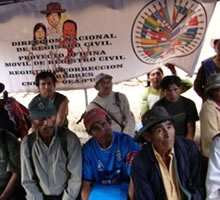 Through mobile registration and publicity campaigns in the Yungas, Manco Kapac, Beni and Chuquisaca regions, and in collaboration with the National Civil Registry Bureau of Bolivia, the right to identity is now a reality for more than 15,000 individuals, most of them indigenous.
Through mobile registration and publicity campaigns in the Yungas, Manco Kapac, Beni and Chuquisaca regions, and in collaboration with the National Civil Registry Bureau of Bolivia, the right to identity is now a reality for more than 15,000 individuals, most of them indigenous.
It is expected that by 2011 about 6,000 people in the rural areas of Potosi will have benefited from this mobile registration system.
Both operations have been funded through the Spanish International Development Cooperation Agency (AECID).
The Eastern Caribbean States: Antigua y Barbuda, Dominica, Grenada, St. Kitts y Nevis, Saint Lucia y St. Vincent.
Civil registry modernization. Computerization of records
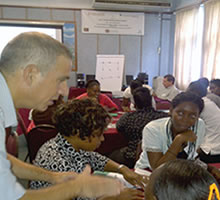 The objective in this region is to digitize the information contained in record books at the civil registries for vital records; primarily for births, deaths and marriages.
The objective in this region is to digitize the information contained in record books at the civil registries for vital records; primarily for births, deaths and marriages.
Additionally, this data will be stored in a searchable database using a customized Caribbean Civil Registry and Identity System (CCRIS) application with the registries having the ability to edit these records and print certificates on a secure media for issuing to the citizens in the country. It is expected that after an initial six (6) month period where a significant majority of work to digitize these historical records, which date as far back as 1905 would have been captured, the member states will integrate the project into their daily operational procedures.
The Canadian cooperation agency is funding the execution of this project, along with funds from USA and Chile.
El Salvador
Strengthening the Hospital Records System
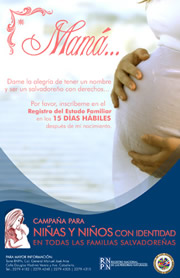
Since 2008, PUICA has supported the National Registry of
Natural Persons in the implementation of a hospital
registry of the National Hospitals of Sonsonate and
Ahuachapan. Between January and October 2011,
6.842 entries have taken place, 74% of births in the
offices of these two hospitals. Since opening in
December 2008 (Sonsonate) and August 2009 (Ahuachapan),
there have been 16.589 entries. The project contemplates
a continuous effort to raise awareness of the importance
of an identity at birth. Currently, an agreement is planned
to be signed with the Ministry of Health which will allow
the opening of offices in different hospitals of El Salvador
and shortly the opening of a third project office at the
Hospital San Miguel. The proposed hospital system in
El Salvador was funded by grants from the Spanish Agency for
International Development Cooperation (AECID).
Guatemala
Mobile registration and publicity campaigns. Institutional strengthening. Process audits
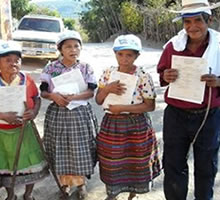 PUICA has been working with the National Registry of Persons (RENAP) since 2008 with funds from the Spanish cooperation. Several registration and awareness campaigns were executed in different areas of the country including the municipalities of Chichicastenango, San Pedro Sacatepequez, San Juan Sacatepequez, San Raimundo, and Huehuetenango. Through training and cooperation of community leaders, more than 3,000 people were registered for the first time. In addition, campaigns managed to consolidate a network of local actors who continue to promote the civil registry in the area. As a result of these campaigns, and by decision of the RENAP, the Office for the reduction of under registration was created with the purpose of achieving universal registration. PUICA will collaborate in the strengthening of that office to expand thus gradually registration services to all remote populations nationwide.
PUICA has been working with the National Registry of Persons (RENAP) since 2008 with funds from the Spanish cooperation. Several registration and awareness campaigns were executed in different areas of the country including the municipalities of Chichicastenango, San Pedro Sacatepequez, San Juan Sacatepequez, San Raimundo, and Huehuetenango. Through training and cooperation of community leaders, more than 3,000 people were registered for the first time. In addition, campaigns managed to consolidate a network of local actors who continue to promote the civil registry in the area. As a result of these campaigns, and by decision of the RENAP, the Office for the reduction of under registration was created with the purpose of achieving universal registration. PUICA will collaborate in the strengthening of that office to expand thus gradually registration services to all remote populations nationwide.
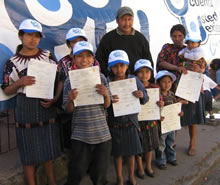 In 2010, and at the request of the Government of
In 2010, and at the request of the Government of
Guatemala, PUICA conducted an audit of the
RENAP processes. A plan of action was formulated
at the legal level, processes, and information
technology, where the tasks necessary to provide
a solution to the problems presented by the RENAP
were defined. Debugging the data of the DPI was
established within these actions. A team of OAS advisors
together with the RENAP ran the project verification and
cleansing of data of the IPR, which took place between
December 2010 and August 2011.
More than 5.3 million records of DPI were verified.
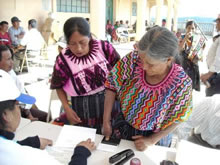 Since September 2011, PUICA jointly with the Ministry of public health and the RENAP, has developed a pilot installation of auxiliary RENAP headquarters in 5 hospitals to facilitate timely registration before leaving the hospital of all babies that are born. Offices have been set up in Roosevelt Hospital, Quetzaltenango, Escuintla and Chimaltenango.
Since September 2011, PUICA jointly with the Ministry of public health and the RENAP, has developed a pilot installation of auxiliary RENAP headquarters in 5 hospitals to facilitate timely registration before leaving the hospital of all babies that are born. Offices have been set up in Roosevelt Hospital, Quetzaltenango, Escuintla and Chimaltenango.
The project was funded by grants from the Spanish Agency for International Development Cooperation (AECID).
Haiti
Modernization and integration of the Haitian civil registry system
The Haiti project is made up of three components:
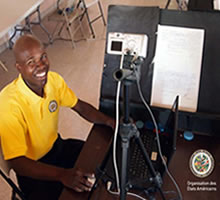 1. Support to the National Identification Office (ONI): To this date more than 4.8 million Haitians (85% of the adult population) now have been registered as a result of mobile registration campaign. In turn, the staff of the ONI has been trained, equipping the facility with the necessary technology and infrastructure to allow the opening of 141 offices across the country.
1. Support to the National Identification Office (ONI): To this date more than 4.8 million Haitians (85% of the adult population) now have been registered as a result of mobile registration campaign. In turn, the staff of the ONI has been trained, equipping the facility with the necessary technology and infrastructure to allow the opening of 141 offices across the country.
It is also important to note that PUICA accompanied the National Identification Office in the process of preparation for the 2011 presidential elections, supporting the reissuing of lost ID cards, issuance of new documents and distributing them.
2. Support to the National Archives of Haiti (ANH): More than 16 millones historical records have been digitalized in an electronic database, and 80 operators have been trained who are responsible for entering the information into the system.
3. Support to the registration of minors in the Civil Registry: The support in this area consists in the implementation of census campaigns, pilot registration projects in hospitals, and an effort to revise and modernize the law governing the national registration system.
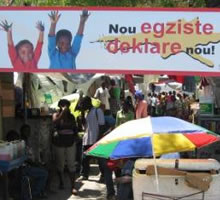 This project is being implemented with financial support
This project is being implemented with financial support
of the Canadian International Development
Agency (CIDA/ACDI).
PUICA also works with the National School of
Public Administration, Quebec, and with other
national and international actors.
Honduras
Reducing the Sub-Rgesitry Rate in the area of the Chamelecon River in the region of San Pedro Sula and the preparation of a diagnosis of technological infrastructure for the municipal offices
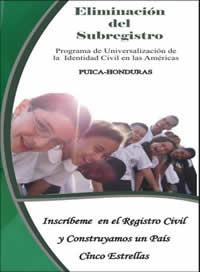 The current PUICA project, which is being executed in a joined effort with the National Registry of People (NRP) aims to contribute to the improvement of the situation of registration in the area of the Chamelecon River in the region of San Pedro Sula while elaborating a diagnosis of technological infrastructure for the municipal offices. This initiative will be financed with funds from the United States.
The current PUICA project, which is being executed in a joined effort with the National Registry of People (NRP) aims to contribute to the improvement of the situation of registration in the area of the Chamelecon River in the region of San Pedro Sula while elaborating a diagnosis of technological infrastructure for the municipal offices. This initiative will be financed with funds from the United States.
Mexico
Promotion of Civil Identity. Sharing Best Practices. Awareness
In Mexico, the strategy is based on cooperation with the National Registry of Population and Personal Identification to promote civil identity nationwide. To that end, an international symposium on measuring under-registration of births was held, and a workshop on best practices in civil registration technologies was conducted, along with a number of publicity campaigns to promote the importance of civil identity.
Canadian cooperation funds have helped these projects to be financially viable.
Paraguay
Modernization of the Civil Registry. Digitizing Historical Records. Binational Civil Registry mobile campaign, in border with indigenous communities.
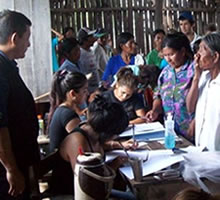 With PUICA’s contribution of computer equipment and technical support, the staff of civil registry has digitized 2.943.000 of a total of 9.127.000 of birth, marriage and death records, already entered in the database. Interoperability is contemplated between the registry and other public entities in order to provide greater transparency in the management, minimize bureaucracy, generate reliable statistics and preserve original documents. The creation of the database of the Civil Identity Registry has been possible through non-reimbursable financial cooperation from the Canadian International Development Agency and a loan from the Inter-American Development Bank.
With PUICA’s contribution of computer equipment and technical support, the staff of civil registry has digitized 2.943.000 of a total of 9.127.000 of birth, marriage and death records, already entered in the database. Interoperability is contemplated between the registry and other public entities in order to provide greater transparency in the management, minimize bureaucracy, generate reliable statistics and preserve original documents. The creation of the database of the Civil Identity Registry has been possible through non-reimbursable financial cooperation from the Canadian International Development Agency and a loan from the Inter-American Development Bank.
At the beginning of 2012, PUICA will support the Civil Registry by carrying out mobile registration campaigns in indigenous communities in the border with Bolivia, where a significant number of people do not have a birth certificate or identity card and therefore, have no access to state social programs. This project is funded by the German Agency for International Cooperation.
Peru
Mobile registration and publicity campaigns. Rebuilding destroyed records
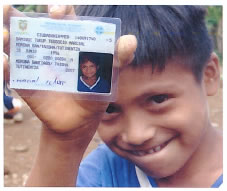 Through the system of mobile registration and publicity campaigns, more than 15,000 people have been registered in Peru. The campaigns were done in Huaycán, San Juan de Lurigancho, and Huancavelica. The records destroyed by the armed conflict with the Shining Path in this latter town were also reconstructed.
Through the system of mobile registration and publicity campaigns, more than 15,000 people have been registered in Peru. The campaigns were done in Huaycán, San Juan de Lurigancho, and Huancavelica. The records destroyed by the armed conflict with the Shining Path in this latter town were also reconstructed.
These projects were funded with help from Spain, USA, and Italy.
Bolivia, Ecuador, Paraguay and Peru
Promotion of Right to Identity
The Project for the promotion of the right to an identity in Bolivia, Ecuador, Paraguay and Peru contemplates several components. Four of them correspond to the execution of campaigns of registration and civil identification in the borders of Peru - Ecuador and Bolivia-Paraguay where sub-registration is severe. During the implementation of the project, civil registry institutions will receive technical assistance from PUICA in developing and implementing national methodologies to be exchanged between the countries contemplated in the project. As a result, civil registries will apply lessons learned and will be able to replicate these new methodologies in similar areas.
This Project is being executed with funds from the German Agency for International Cooperation (GTZ).
Regional activities
In addition to technical assistance projects, PUICA organizes regional activities such as meetings, workshops and activities of horizontal cooperation with other institutions of civil registry in the region.